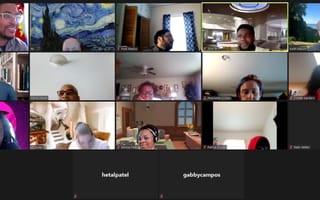
A Chicago bootcamp’s first class of coders from the south and west sides will soon graduate and head for the job market. The city-sponsored initiative comes amid rising federal tech training investment among municipalities across the United States.
Since Congress passed the Coronavirus Aid, Relief, and Economic Security (CARES) Act in March, cities in North Carolina, Louisiana, Virginia and more have spent the cash on programming programs for their workforces.
Sean Petersen, director of marketing and operations at the Charlotte, North Carolina-based Tech Talent South training company, said he expects that trend to only accelerate as unemployment increases and the gap between computer science graduates and open computing jobs grows — in 2018, there were 2,600 local computer science graduates and 13,600 open computing jobs in Illinois. The majority of grads were white, and many of these workforce programs aim to drive minority representation in the notoriously homogenous tech industry.
“Cities, towns and municipalities are really looking to invest in their local workforces,” Petersen told Built In. “They’re looking at, how do you bridge that digital divide, make sure that the companies have the talent they need to continue growing.”
Chicago officials are deliberately using tech workforce training as a way to drive diversity in the tech industry.
In June, the Chicago Cook Workforce Partnership worked with Coding Temple bootcamp to launch Chi Codes with the aim of increasing Black and Latinx representation in programming and data-oriented professions. The program’s 15 participants all come from neighborhoods on the city’s south and west sides — where joblessness has risen above levels at other areas in the city. Over the course of 10 weeks, participants will learn Python, SQL and front-end JavaScript development. Chi Codes’ first cohort is set to graduate in early December and the city will provide $10,000 to any company that hires the students.
Ripal Patel, director of business development at the Chicago-based Coding Temple, said he believes demand from local tech companies for diverse candidates has only increased recently.
“I think everyone has been trying to do that for years and years,” Patel told Built In. “But I think more people are now wanting to actually make it happen.”
Patel identifies as Indian, and said he learned coding in high school, with plenty of aunts, uncles and cousins working in the tech industry to serve as mentors. He hopes Chi Codes will create a pipeline for Black and Latinx participants to enter the industry and set an example for their communities.
“Everyone wants to follow someone’s footsteps,” Patel said. “This is just driving more and more individuals to the tech world that we have not had in the past. We can help build a community by doing this.”
A similar effort is also launching in Austin. This week. the city of Austin partnered with Tech Talent South to unveil the RE:WorkNow initiative, a free, full-stack development bootcamp that aims to enroll 260 Travis County residents by mid-December.
The program is funded through a mix of CARES Act cash and city funds, Petersen said. In addition to teaching a crash course in coding, participants will receive a $200 weekly stipend, career advising and help with eventual job placement. Although the COVID-19 pandemic has upended the local job market, it has not changed the demand for tech talent in Austin.
The city has added a record number of new positions this year, with tech companies driving a majority of the growth. In September, software developers were the most common role advertised as available across all industries in the city. He said Austin’s program should represent a model for other municipalities, since it is a long-term investment aimed at strengthening the connection between underrepresented groups in the tech industry and local companies.
“For the city of Austin, which has been a growing tech center, I think it will be really fascinating to see the long-term growth of these program participants, and really the way they stake their claim in their community and in the tech community,” Petersen said.




